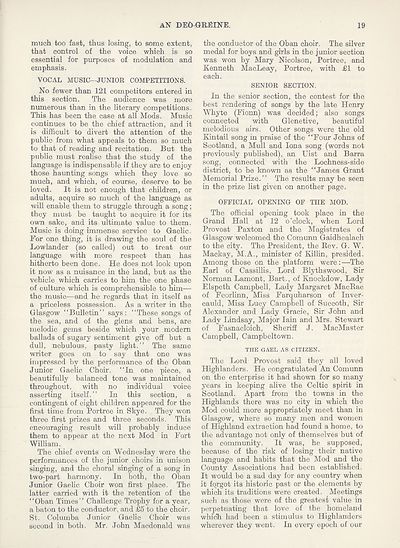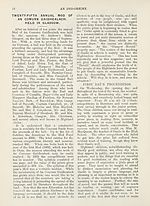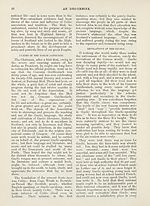An Comunn Gàidhealach Publications > Deo-gréine > Volume 17, October 1921 to September 1922
(27) Page 19
Download files
Complete book:
Individual page:
Thumbnail gallery: Grid view | List view

AN DEO-GREINE.
19
much too fast, thus losing, to some extent,
that control of the voice which is so
essential for purposes of modulation and
emphasis.
VOCAL MUSIC—JUNIOR COMPETITIONS.
No fewer than 121 competitors entered in
this section. The audience was more
numerous than in the literary competitions.
This has been the case at all Mods. Music
continues to be the chief attraction, and it
is difficult to divert the attention of the
public from what appeals to them so much
to that of reading and recitation. But the
public must realise that the study of the
language is indispensable if they are to enjoy
those haunting songs which they love so
much, and which, of course, deserve to be
loved. It is not enough that children, or
adults, acquire so much of the language as
will enable them to struggle through a song;
they must be taught to acquire it for its
own sake, and its ultimate value to them.
Music is doing immense service to Gaelic.
For one thing, it is drawing the soul of the
Lowlander (so called) out to treat our
language with more respect than has
hitherto been done. He does not look upon
it now as a nuisance in the land, but as the
vehicle which carries to him the one phase
of culture which is comprehensible to him—
the music—and he regards that in itself as
a priceless possession. As a writer in the
Glasgow “Bulletin” says: “These songs of
the sea, and of the glens and bens, are
melodic gems beside which your modem
ballads of sugary sentiment give off but a
dull, nebulous, pasty light.” The same
writer goes on to say that one was
impressed by the performance of the Oban
Junior Gaelic Choir. “In one piece, a
beautifully balanced tone was maintained
throughout, with no individual voice
asserting itself.” In this section, a
contingent of eight children appeared for the
first time from Portree in Skye. They won
three first prizes and three seconds. This
encouraging result will probably induce
them to appear at the next Mod in Fort
William.
The chief events on Wednesday were the
performances of the junior choirs in unison
singing, and the choral singing of a song in
two-part harmony. In both, the Oban
Junior Gaelic Choir won first place. The
latter carried with it the retention of the
“Oban Times” Challenge Trophy for a year,
a baton to the conductor, and £5 to the choir.
St. Columba Junior Gaelic Choir was
second in both. Mr. John Macdonald was
the conductor of the Oban choir. The silver
medal for boys and girls in the junior section
was won by Mary Nicolson, Portree, and
Kenneth MacLeay, Portree, with £1 to
each.
SENIOR SECTION.
In the senior section, the contest for the
best rendering of songs by the late Henry
Whyte (Fionn) was decided; also songs
connected with Glenetive, beautiful
melodious airs. Other songs were the old
Kintail song in praise of the “Four Johns of
Scotland, a Mull and Iona song (words not
previously published), an Uist and Barra
song, connected with the Lochness-side
district, to be known as the “James Grant
Memorial Prize. ’ ’ The results may be seen
in the prize list given on another page.
OFFICIAL OPENING OF THE MOD.
The official opening took place in the
Grand Hall at 12 o’clock, when Lord
Provost Paxton and the Magistrates of
Glasgow welcomed the Comunn Gaidhealach
to the city. The President, the Bev. G. W.
Mackay, M.A., minister of Killin, presided.
Among those on the platform were: —The
Earl of Cassillis, Lord Blythswood, Sir
Norman Lament, Bart., of Knockdow, Lady
Elspeth Campbell, Lady Margaret MacBae
of Feorlinn, Miss Farquharson of Inver-
cauld, Miss Lucy Campbell of Succoth, Sir
Alexander and Lady Grade, Sir John and
Lady Lindsay, Major Iain and Mrs. Stewart
of Fasnacloich, Sheriff J. MacMaster
Campbell, Campbeltown.
THE GAEL AS CITIZEN.
The Lord Provost said they all loved
Highlanders. He congratulated An Comunn
on the enterprise it had shown for so many
years in keeping alive the Celtic spirit in
Scotland. Apart from the towns in the
Highlands there was no city in which the
Mod could more appropriately meet than in
Glasgow, where so many men and women
of Highland extraction had found a home, to
the advantage not only of themselves but of
the community. It was, he supposed,
because of the risk of losing their native
language and habits that the Mod and the
County Associations had been established.
It would be a sad day for any country when
it forgot its historic past or the elements by
which its traditions were created. Meetings
such as those were of the greatest value in
perpetuating that love of the homeland
which had been a stimulus to Highlanders
wherever they went. In every epoch of our
19
much too fast, thus losing, to some extent,
that control of the voice which is so
essential for purposes of modulation and
emphasis.
VOCAL MUSIC—JUNIOR COMPETITIONS.
No fewer than 121 competitors entered in
this section. The audience was more
numerous than in the literary competitions.
This has been the case at all Mods. Music
continues to be the chief attraction, and it
is difficult to divert the attention of the
public from what appeals to them so much
to that of reading and recitation. But the
public must realise that the study of the
language is indispensable if they are to enjoy
those haunting songs which they love so
much, and which, of course, deserve to be
loved. It is not enough that children, or
adults, acquire so much of the language as
will enable them to struggle through a song;
they must be taught to acquire it for its
own sake, and its ultimate value to them.
Music is doing immense service to Gaelic.
For one thing, it is drawing the soul of the
Lowlander (so called) out to treat our
language with more respect than has
hitherto been done. He does not look upon
it now as a nuisance in the land, but as the
vehicle which carries to him the one phase
of culture which is comprehensible to him—
the music—and he regards that in itself as
a priceless possession. As a writer in the
Glasgow “Bulletin” says: “These songs of
the sea, and of the glens and bens, are
melodic gems beside which your modem
ballads of sugary sentiment give off but a
dull, nebulous, pasty light.” The same
writer goes on to say that one was
impressed by the performance of the Oban
Junior Gaelic Choir. “In one piece, a
beautifully balanced tone was maintained
throughout, with no individual voice
asserting itself.” In this section, a
contingent of eight children appeared for the
first time from Portree in Skye. They won
three first prizes and three seconds. This
encouraging result will probably induce
them to appear at the next Mod in Fort
William.
The chief events on Wednesday were the
performances of the junior choirs in unison
singing, and the choral singing of a song in
two-part harmony. In both, the Oban
Junior Gaelic Choir won first place. The
latter carried with it the retention of the
“Oban Times” Challenge Trophy for a year,
a baton to the conductor, and £5 to the choir.
St. Columba Junior Gaelic Choir was
second in both. Mr. John Macdonald was
the conductor of the Oban choir. The silver
medal for boys and girls in the junior section
was won by Mary Nicolson, Portree, and
Kenneth MacLeay, Portree, with £1 to
each.
SENIOR SECTION.
In the senior section, the contest for the
best rendering of songs by the late Henry
Whyte (Fionn) was decided; also songs
connected with Glenetive, beautiful
melodious airs. Other songs were the old
Kintail song in praise of the “Four Johns of
Scotland, a Mull and Iona song (words not
previously published), an Uist and Barra
song, connected with the Lochness-side
district, to be known as the “James Grant
Memorial Prize. ’ ’ The results may be seen
in the prize list given on another page.
OFFICIAL OPENING OF THE MOD.
The official opening took place in the
Grand Hall at 12 o’clock, when Lord
Provost Paxton and the Magistrates of
Glasgow welcomed the Comunn Gaidhealach
to the city. The President, the Bev. G. W.
Mackay, M.A., minister of Killin, presided.
Among those on the platform were: —The
Earl of Cassillis, Lord Blythswood, Sir
Norman Lament, Bart., of Knockdow, Lady
Elspeth Campbell, Lady Margaret MacBae
of Feorlinn, Miss Farquharson of Inver-
cauld, Miss Lucy Campbell of Succoth, Sir
Alexander and Lady Grade, Sir John and
Lady Lindsay, Major Iain and Mrs. Stewart
of Fasnacloich, Sheriff J. MacMaster
Campbell, Campbeltown.
THE GAEL AS CITIZEN.
The Lord Provost said they all loved
Highlanders. He congratulated An Comunn
on the enterprise it had shown for so many
years in keeping alive the Celtic spirit in
Scotland. Apart from the towns in the
Highlands there was no city in which the
Mod could more appropriately meet than in
Glasgow, where so many men and women
of Highland extraction had found a home, to
the advantage not only of themselves but of
the community. It was, he supposed,
because of the risk of losing their native
language and habits that the Mod and the
County Associations had been established.
It would be a sad day for any country when
it forgot its historic past or the elements by
which its traditions were created. Meetings
such as those were of the greatest value in
perpetuating that love of the homeland
which had been a stimulus to Highlanders
wherever they went. In every epoch of our
Set display mode to:
![]() Universal Viewer |
Universal Viewer | ![]() Mirador |
Large image | Transcription
Mirador |
Large image | Transcription
| An Comunn Gàidhealach > An Comunn Gàidhealach Publications > Deo-gréine > Volume 17, October 1921 to September 1922 > (27) Page 19 |
|---|
| Permanent URL | https://digital.nls.uk/127170297 |
|---|
| Description | Leabhar 17, Treasamh Mios an Fhoghair 1921 gu Dara Mìos an Fhoghair 1922 |
|---|---|
| Attribution and copyright: |
|
| Description | This contains items published by An Comunn, which are not specifically Mòd-related. It includes journals, annual reports and corporate documents, policy statements, educational resources and published plays and literature. It is arranged alphabetically by title. |
|---|
| Description | A collection of over 400 items published by An Comunn Gàidhealach, the organisation which promotes Gaelic language and culture and organises the Royal National Mòd. Dating from 1891 up to the present day, the collection includes journals and newspapers, annual reports, educational materials, national Mòd programmes, published Mòd literature and music. |
|---|---|
| Additional NLS resources: |
|

